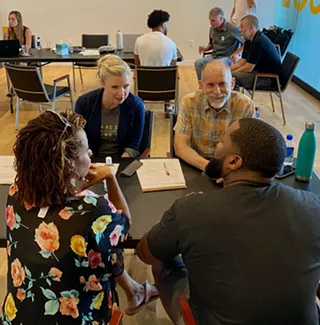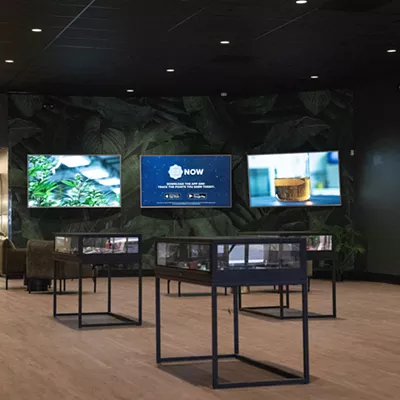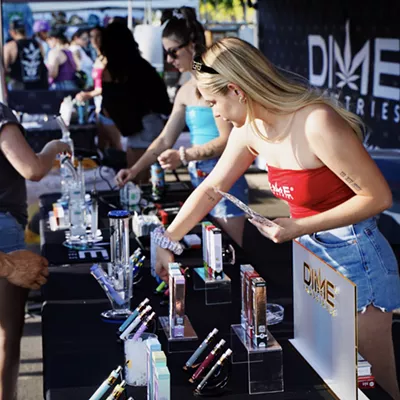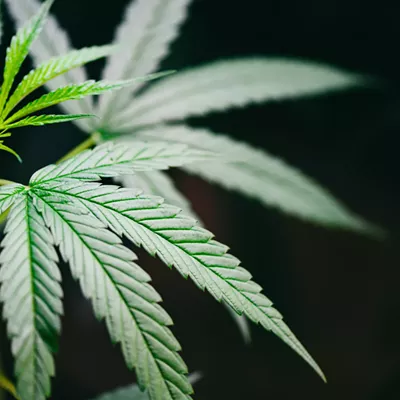There are nearly 200,000 estimated expungable cannabis offenses throughout the state of Arizona and on July 12, the floodgates will open for those affected by old cannabis laws to petition to have charges on their criminal records sealed.
While some petitioners may be able to expedite the process through the websites of their county attorney’s office, many will likely need some help navigating the system.
To help affected individuals figure out how to move forward, Southern Arizona NORML will host a self-help expungement clinic in Tucson at Harambe Café, 6464 E. Tanque Verde, from 10 a.m. to 4 p.m. on Saturday, July 3.
The clinic will be conducted by lawyers specializing in amicus or criminal law, who will walk qualified applicants through the process.
“We provide people with information about how they can fill out petitions themselves, so these are self-help clinics,” Arizona NORML Communications Director Jon Udell said. “We’re not going to file petitions for people. There’s a lot of risk that goes along with doing that. We’ll essentially walk them through the petition that was released by the Arizona Supreme Court, explain what the different sections require and provide information.”
AZNORML has been recruiting and training volunteer attorneys so they are prepared to successfully guide individuals through the process.
“Luckily, the petitions are not an incredibly complex legal endeavor,” Udell said. “It’s fairly simple and
straightforward.”
There are likely to be exceptions, though, and unique cases that require a more individualized approach, according to Udell.
For instance, if someone was arrested for possession of an ounce of cannabis and later violated probation with a firearms possession, under the new law neither of those offenses would have taken place now that pot is legal. There are also inmates serving time in prison who might not have been there had it not been for low-level marijuana charges.
So there might be “gray areas” that require a more complex approach and will likely set new legal precedents.
“There could be some cases like these, and some of the bigger-impact legal groups will step in and try to take on some of them,” Udell said. “They will take up the appellate courts and get some good binding case law to help other people out.”
But for the majority of people, it will be fairly straightforward.
While there is nothing in place to address federal offenses, anyone with charges including misdemeanors should consider getting their records cleared, as even low-level possession charges can come back to haunt such individuals.
“Misdemeanor charges can show up in people’s background reports and you can have employers refuse to hire them—there’s nothing stopping them from doing that,” Udell said. “Apartment complexes and landlords can also refuse to rent to you.”
The clinic is open to the public and drop-ins are welcome. Attendees are encouraged to bring as much documentation as possible relative to their previous cases or arrests in Arizona, including arrest records, criminal complaints and/or sentencing orders. Individuals who do not have documentation are still encouraged to attend.
AZNORML will host several additional clinics in the Phoenix area in the days leading up to July 12. More information can be found at arizonanorml.org.
Another option to file a petition is available at the Pima County Attorney’s Office website at www.pcao.pima.gov/prop207 for individuals with simple and straightforward cases.
According to PCAO Senior Counsel Jack Chin, there are somewhere in the neighborhood of 116,000 drug-related cases “potentially eligible” for expungement in Pima County since 1995—as far back as online records go—but 90% of those will not qualify.
“When we actually take a look at these cases, a lot of them will not be eligible,” Chin said. “That [number] includes all of the narcotics cases. Some of them aren’t going to involve cannabis, and some of them, if they do involve cannabis, are going to involve an amount that’s over the limit. But this is the giant pool that we have to sort through.”
PCAO will initiate an effort to assess those cases, but individuals who apply online will have priority over cases where expungement has not been directly requested by the individual.
Julie Gunnigle, Arizona NORML’s director for politics and civic engagement, recommends a cautious approach to the online county attorney’s method because of privacy issues and a vague timeline. She also thinks that a crush of early, self-filed petitions will have a snowball effect and show that there is nothing to fear from the process.
“We’ve really tried to be intentional about driving that early turnout, because that’s going to drive further turnout and more people coming forward,” Gunnigle said. “The way it’s structured right now is entirely dependent on somebody raising their hand and saying, ‘Yep, that’s me, I have a prior conviction,’ and recognizing that for directly impacted people, there’s still a ton of stigma around cannabis.”
High turnout can also help bridge barriers with those in Black, Indigenous, and other communities of color (BIPOC), where citizens are far more likely to be prosecuted for drug offenses.
“I’m hoping that as they see a rush, more people feel confident that clinics like ours can provide them real legal relief,” Gunnigle said. “Because when it comes to access to justice, there’s so many people who’ve fallen through the cracks and who’ve been just straight up lied to.”
According to 2020 analysis by the American Civil Liberties Union, Black people are 3.64 times more likely than white people to be arrested for marijuana possession, “notwithstanding comparable usage rates.”
The report, titled “A Tale of Two Countries: Racially Targeted Arrests in the Era of Marijuana Reform, 2020,” stated: “In every single state, Black people were more likely to be arrested for marijuana possession, and in some states, Black people were up to six, eight, or almost 10 times more likely to be arrested. In 31 states, racial disparities were actually larger in 2018 than they were in 2010.”
Chin says Pima County “doesn’t have perfect records” on racial demographics related to cannabis arrests, but his quick search of the county’s database of marijuana-only cases showed that since 1995, there were 9,600 of them. About 3,000 of those cases do not have racial data, about 3,000 were white and the other third are from Hispanic, Black and Indigenous communities.
“We do try and track the defendant’s race in our database, but we have a large number of blanks there,” he said. “We just don’t know.”
Chin emphasized Pima County has no intention of using information provided on the website for anything beyond expediting expungement, although if someone has an active warrant, immigration issues or some other complication, they should consult with a lawyer before they submit petitions.
“We’re asking people to file a petition on the website, so we can clear their record. This is not a trap,” Chin said. “We do ask for their email address and for their address, because we’re required to put that in the petition. But, we’re not just trying to gather information on people so that we can use it against them.”
On the other hand, Chin added, if somebody has an open warrant, or has escaped from prison or some other legal complication, “we’re gonna have to act,” he said.
“But if somebody has questions about their criminal justice status, or about their immigration status, they should talk to a lawyer,” he said.
While some petitions will be generated from the PCAO, most will come from petitioners’ requests. If prosecutors cannot show clear and convincing evidence that the offense is ineligible for expungement, it will be expunged if the petitioner files a request.
“The lack of information is not held against the person with a conviction, it’s held against the state,” Chin said. “Our offices are in communication with the Public Defender’s (Office), we’re in contact with the Superior Court and the Justice Court, and I think everybody’s interested in cooperating to make this as efficient and effective as possible.”
Gunnigle believes the most efficient and fair way to do it would be a blanket expungement driven by prosecutors’ offices throughout the state.
“They really should recognize that it is unfair to ask people who have been subjected to prosecution for this unjust war on drugs to have to step forward and do this on their own, and it is far less work for them to find them,” she said. “It’s about money. It’s about resources. It’s about time ... I really don’t have a whole lot of sympathy for folks saying that it’s too hard to undo the harm that they’ve caused.”
Ultimately, expungement is about righting wrongs brought about by the decades-long War on Drugs and giving people who are not otherwise criminals a second chance.
“We’re doing this because the people of the state of Arizona wanted marijuana records cleared,” Chin said. “We are cooperating in that, because we think it promotes public safety and to give people the opportunity to have a clear record and get housing and employment and all that.”








